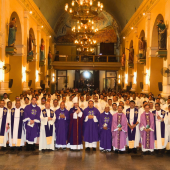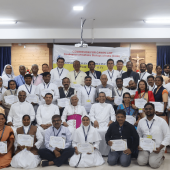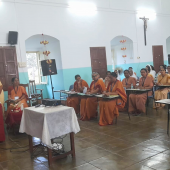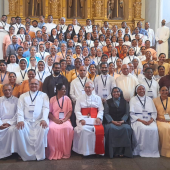India’s Church Leaders Commit to Building a Synodal Church Rooted in Dialogue and Communion
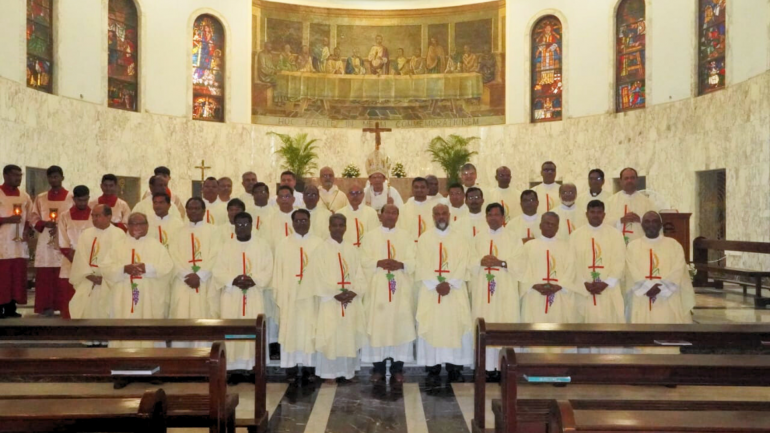
With a shared vision of walking together as one family of faith, Church leaders, theologians, clergy, religious, and lay representatives from across India gathered at St. Pius X College, Goregaon, Mumbai, from October 24 to 26 for the National Symposium on “Walking Together as One Family: Building a Synodal Church in India.”
The event, jointly organized by the CCBI Commission for Theology and Doctrine along with the Commissions for Canon Law and the Laity, sought to renew the Indian Church’s commitment to journey as a community of listening, participation, and mission, values at the heart of Pope Francis’ call for a Synodal Church.
A Call to Conversion and Mission
In his keynote address at the inaugural session, Archbishop John Rodrigues of Bombay underlined that the heart of Synodality lies in being called by the Holy Spirit to conversion.
“God’s heart has a special place for the poor,” he reminded participants, emphasizing that faith must always lead to concrete action. “We must serve because we are the hands and feet of God. Christ’s light should shine through us.”
He added that the Synod is not merely a process but a transformative experience for the Church: “Mission illuminates Synodality, and Synodality, in turn, renews our enthusiasm for mission. It is also a path of spiritual renewal that helps us organize ourselves better as a community of faith.”
The evening concluded with a vibrant cultural program, a musical presentation by the children of Bal Bhavan, Andheri, followed by dinner, setting a tone of joy and communion for the days ahead.
Deepening Communion, Fostering Dialogue
The symposium’s second day opened with the Holy Eucharist celebrated by Archbishop Rodrigues, followed by sessions exploring how India’s rich diversity can become a source of unity rather than division.
Rev. Dr. S. M. Michael, SVD, described India’s pluralism as a “gift to be celebrated,” while Rev. Dr. Gilbert De Lima spoke on fostering dialogue across religions and cultures. He emphasized that interreligious dialogue is not about asking, “What can I do for you?” but rather, “What can we do together for all?”
Both speakers highlighted that the Church in India must embrace inclusivity while remaining deeply rooted in faith.
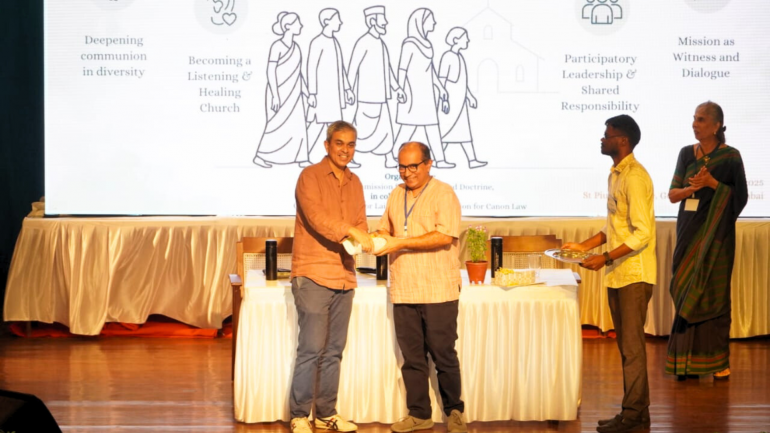
Listening, Healing, and Sharing Responsibility
Session II, moderated by Bishop Savio Fernandes, focused on “Becoming a Listening and Healing Church.” Rev. Sr. Mary Sujita, SND, called for confronting clericalism, caste discrimination, and gender inequality, noting that a truly Synodal Church must be one that “listens to wounds and hopes alike.”
“Where there is caste discrimination,” Sr. Sujita emphasized, “mission loses credibility.”
Jesuit priest Dr. Konrad Noronha, founder of the Center for Safeguarding and Human Formation, encouraged the creation of “safe spaces for truth-telling, reconciliation, and collective discernment.”
The afternoon was devoted to “Conversations in the Spirit,” an exercise in prayerful dialogue facilitated by Bishop Allwyn D’Silva. Participants met in small groups to listen to one another in faith and discern the movement of the Spirit, a method first introduced during the Mumbai Synod and now adopted at the national level.
Evening sessions turned to participatory leadership and shared responsibility, with Rev. Dr. Merlin Ambrose and Mr. Vincent D’Silva urging parishes and dioceses to move from “mere consultation to genuine co-responsibility.”
Referring to the Final Document on Synodality and its proposal for a revision of Canon Law from a Synodal perspective, Dr. Ambrose noted that necessary revisions will be undertaken by the relevant ecclesial bodies.
Cardinal Oswald Gracias, in his address, drew on his experience from the global Synod on Synodality, stressing that “every baptized person is responsible for the life of the Church.”
He recalled that the roundtable discussion format, later adopted at the Vatican Synod, was first practiced during the local Mumbai Synod. “We all share responsibility for the Church,” he said. “We love the Church because it is our home.”
Mission as Witness and Dialogue
The final day’s discussions, moderated by Fr. Luke Rodrigues, SJ, centered on the missionary dimension of Synodality.
Dr. Armida Fernandez, founder of SNEHA, spoke about the Church’s call to engage compassionately with “the poor, the marginalized, and the suffering.” SNEHA, a Mumbai-based NGO, works to improve healthcare among marginalized urban communities.
Mr. Royston Braganza, CEO of Grameen Capital India, highlighted that evangelization today must mean “listening, witnessing, and humble sharing rather than proselytizing.”
The symposium concluded with reflections on strategies to realize a Synodal Church, a vote of thanks by Rev. Dr. Henry Jose, MSFS, the National Anthem, and a final hymn to Our Lady. Participants departed with renewed hope and commitment.
Walking Forward in Faith
Throughout the three-day gathering, participants experienced a spirit of communion and shared discernment.
The insights drawn from this national symposium will serve as guiding lights for dioceses and parishes across India as they continue to build a Church of communion, participation, and mission, a truly Synodal Church walking together as one family of God.
(Sr. Dorothy Adaha, FSP, is a Daughter of St. Paul based in Mumbai, western India.)
Radio Veritas Asia (RVA), a media platform of the Catholic Church, aims to share Christ. RVA started in 1969 as a continental Catholic radio station to serve Asian countries in their respective local language, thus earning the tag “the Voice of Asian Christianity.” Responding to the emerging context, RVA embraced media platforms to connect with the global Asian audience via its 21 language websites and various social media platforms.









